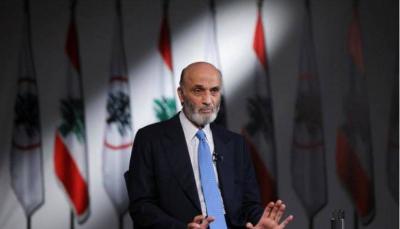The newspaper Call of the Nation wrote: It was not by chance or without basis that "Call of the Nation" described last week the escalating campaigns being undertaken by the presidency and its political movement in all political, judicial, financial, and banking directions as falling within the context of a "war to abolish elections" through a "destructive roadmap" aimed at instilling widespread chaos in the country to undermine the necessary security and social stability to ensure the ground for conducting the parliamentary elections on the scheduled date of May 15. Everything that the Lebanese have witnessed, are witnessing, and will witness in the few days leading up to this date confirms the direction toward this goal, especially after the "Shiite duo's judiciary" has aligned itself with the "Aouni judiciary" to achieve this objective by justifying it through various available means and tools, according to opposition political sources. These sources clarified that the accusations made by Judge Fadi Aikiki against the leader of the "Lebanese Forces" Samir Geagea in connection with the events in Tayouneh contribute to "fuelling the atmosphere of mobile tension and systematic destruction in the country to derail the elections, in conjunction with the trajectory of financial and banking accusations being filed by Judge Ghada Aoun."
Yesterday, Judge Aoun escalated her punitive measures on the banking sector by issuing a new decision preventing six banks from transferring and moving money abroad, thereby imposing "financial isolation" between these Lebanese banks and correspondent banks, which could lead to negative repercussions on traders' and industrialists' accounts to finance the import of goods and essential materials for the Lebanese market from abroad. This comes alongside tightening the judicial noose around the Governor of the Central Bank, Riad Salameh, either by issuing an arrest warrant by Judge Nicolas Mansour against his brother Raja and keeping him in custody at least until next week, or by scheduling a hearing for the Governor of the Central Bank next Thursday in preparation for issuing an arrest warrant against him if he fails to appear.
The atmosphere of judicial-banking conflict overshadowed the meeting between President Michel Aoun and Prime Minister Najib Mikati yesterday at the Baabda Palace, especially in light of Aoun's dissatisfaction with Mikati's announcement in the cabinet meeting the day before yesterday about his intention to invite the Governor of the Central Bank to a government meeting scheduled for next Wednesday. Sources close to the presidential circles warned of the serious implications of such a step on ministerial solidarity, threatening through "Call of the Nation" with the possibility of "the ministers affiliated with the President of the Republic and the National Movement boycotting any cabinet session held in which Salameh participates, an action that would inevitably lead the ministers of 'Hezbollah' to take the same stance". The sources revealed that "Aoun clearly informed Mikati of his refusal to extend any invitation to the Governor of the Central Bank to participate in the cabinet session, considering him pursued by the judiciary and that an attendance warrant has been issued against him."
In light of these developments, informed circles relayed information indicating that "the issue of agreeing on appointing a replacement for Salameh at the helm of the Central Bank has resurfaced," anticipating that channels of communication will be activated and consultations intensified discreetly in this regard after Mikati returns from his visit to Doha today.
Returning to the step taken by the Government Commissioner to the Military Court against the leader of the "Forces," accusing him of "murder, causing death, and incitement to murder in the Tayouneh massacre case," as reported by Al-Manar TV, Judge Aikiki himself indicated in a statement to Al-Jadeed channel that he had filed the accusation against Geagea based on "new evidence" that he had obtained without disclosing its nature, and then referred the case to the deputy first military investigating judge Fadi Sawwan for necessary actions.
Consequently, the "Lebanese Forces" party promptly categorized the move against its leader as "political retribution," warning against these practices that constitute "systematic destruction of the judiciary and justice in Lebanon, carried out by some judges in response to certain political parties, especially 'Hezbollah' and the 'National Movement,' to take retribution from their political adversaries." The statement from the "Forces" disclosed that Judge Aikiki "evaded" notifying them of the request for recusal submitted by defense lawyers in the "Ain al-Rummaneh incursion" case before the civil appeal court in Beirut, as well as the complaint filed against him with the judicial inspection, as he "dismissed his aides and secretary and remained confined to his home without attending court, deliberately avoiding receiving the recusal request to prevent himself from being removed from the case until he illegally ventured from his home to accuse Geagea of several criminal offenses."
Noting that Aikiki "still remains absent from court until this moment," the "Forces" addressed the President of the Supreme Judicial Council and the General Prosecutor, urging them to assume their judicial responsibilities and "to intervene immediately to put an end to these abnormal practices that threaten to destroy what remains of the judiciary and institutions in Lebanon."




